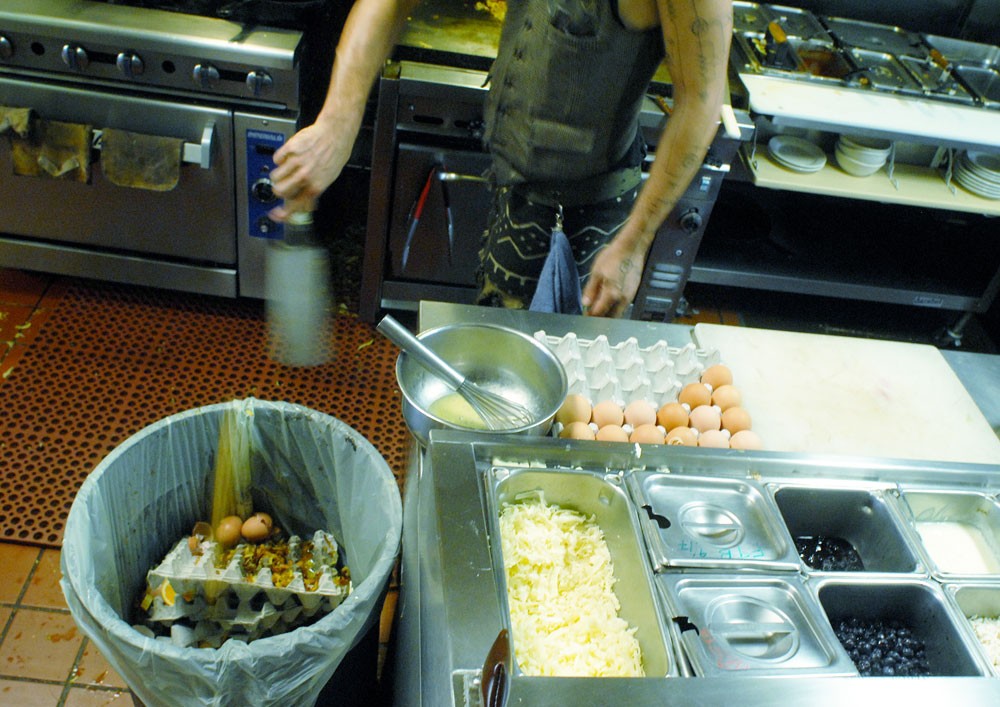By late Wednesday afternoon, the trash bin at the Seward Community Café in South Minneapolis, which opens at 8 a.m., contains only a plastic take-out container from the co-op next door and a strip of cellophane from a pack of cigarettes. Next to the trash, beneath a handwritten sign reading âÄúcompost,âÄù sits a larger bin lined with a green compostable bag . ItâÄôs more than three-quarters full of discarded food, napkins and cups. This bin will be transported to compost facilities in Rosemount, Min n., which will transform its contents into nutrient-rich soil to be used by local farms and Hennepin County development projects. The Seward Café is just one of a couple dozen metro area businesses that embraced the composting program, initiated last summer by RandyâÄôs Sanitation in Delano, Minn. From the plate âĦ The Seward CaféâÄôs emphasis on environmental sustainability drew them to the composting program, employee and University alumnus Benjamin Acaso said. âÄúA lot of our food is organic, so itâÄôs not contributing much pesticide to the environment,âÄù he said. âÄúItâÄôs part of the green movement.âÄù The shift from trash to compost, Acaso said, allowed them to exchange the Seward CaféâÄôs trash dumpster for two normal-sized residential bins. âÄúOf the amount of waste we produced, over half is now being composted,âÄù he said. Although the compost adds about $35 to their weekly garbage costs, Acaso expects prices to level out as they switch all sanitation contracts over to RandyâÄôs Sanitation, which picks up the compost. Most employees and customers have been enthusiastic about the practice, and are slowly learning how it works. âÄúThe customers seem to be doing it pretty well,âÄù he said. âÄúPeople still throw napkins and other compostables into the trash.âÄù Kiley Friedrich , an environmental sciences, policy and management student and Seward Café customer, said she supports the program. âÄúItâÄôs great; we need more local businesses doing that,âÄù she said. âÄúIf that means extra charges for their customers or some sort of compensation, IâÄôd definitely support that.âÄù âĦ To the truck âĦ Slightly different from compost piles that sit moldering in the backyard, these new compost operations embrace items that are traditionally scorned by composters âÄî even meat and cardboard . The compostable waste is shipped out to a county-owned operation in Bloomington, where itâÄôs processed into soil, said Dave Hepfl , senior sales account representative at RandyâÄôs Sanitation. âÄúThey lay it out in 100 yards and make it into 6-by-6 piles, wrap it up in a sausage-like material and shoot heat into it,âÄù Hepfl said. As environmental consciousness has increased, more businesses and citizens have approached RandyâÄôs for environmentally friendly services, including the âÄúorganics recyclingâÄù program, as RandyâÄôs refers to it. âÄúWe have 24 people doing it, from Ikea to Best Buy s world headquarters to little Ma and Pa spots like the Seward Café,âÄù he said. RandyâÄôs will launch a residential program in the Linden Hills neighborhood of Minneapolis in October and is planning future programs in Medicine Lake and Plymouth. âĦ To the field and back again. Minnesota has been a hotbed of composting since the mid-âÄô80s, but manual sorting allowed too many inorganic contaminants. The impure result alienated organic farmers, who are a main market for composted soil, University Extension Services Professor Thomas Halbach, of the department of soil, water and climate, said. âÄúWith source separation, it keeps out all chemicals, metals and other contaminants,âÄù he said. âÄúThat results in a finished product [thatâÄôs] much cleaner.âÄù The resulting product contains fewer pathogens that cause human disease and more probiotic microorganisms that prevent disease in some plants, making it perfect for organic farmers, Halbach said. Three new source-separating compost operations have opened in Minnesota in recent years, Halbach said. âÄúThe trend is in a good direction,âÄù he said. Early adopters like the Seward Café are also optimistic about the potential of the technology, but say theyâÄôre not composting as a âÄúmarketing gimmick.âÄù âÄúThe reason why weâÄôre composting, the main one, is that when there is so much room for landfills, it just fills up the land,âÄù he said.

Image by Marija Majerle
A Seward Community Café worker empties food into a compost bin Wednesday. Each week, the accumulated compost is transported to Rosemount, Minn., where it is transformed into nutrient-rich soil to be used by local farms and Hennepin County development projects.
Compost program trashes landfills
Published September 18, 2008
0
More to Discover







